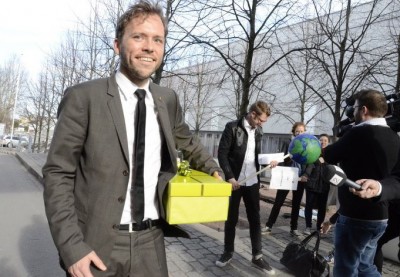Norway’s Socialist Left party (SV) went ahead and elected Audun Lysbakken as its new leader over the weekend, despite a week of crisis that began with Lysbakken’s forced resignation as a government minister. Now SV needs to regain confidence, find and promote a new major issue that will attract voters, and figure out how or even whether it can remain in the country’s three-party government coalition led by Labour Prime Minister Jens Stoltenberg.

The challenges facing SV are daunting for even the most hard-core political veteran, but Lysbakken and his fellow SV officials vowed to move forward. He claimed he’d renew SV by championing “the best of our traditions,” environmental and social justice. Only 15 of of 207 delegates at the party’s national meeting in Lillestrøm submitted blank ballots to protest Lysbakken’s election. No other candidate had emerged to run against him. After disastrous results in last fall’s municipal elections, the majority within SV still think the 34-year-old Lysbakken from Bergen is best-suited to re-energize the party.
“The biggest challenge SV has isn’t the current crisis (which involved funding violations in Lysbakken’s former ministry),” Erik Solheim, a former SV leader who now serves as a government minister (statsråd) in charge of foreign aid and environmental issues, told newspaper Aftenposten. “There’s a storm in the media now, but it will be forgotten. The biggest challenge is to outline a political project that will catch voter attention. We don’t have that. We must have that.”

Solheim and other SV politicians want to shift public attention from crisis and the “mistakes” made during Lysbakken’s ministerial tenure back to political issues, like extending the school day in Norway. But it was the trouble Lysbakken got into, over the funding violations and conflicts of interest while he headed the ministry in charge of family and equality issues, that dominated headlines and the party’s national meeting over the weekend. His planned election as new party leader came at the worst possible time, and both he and other party officials, not least outgoing SV leader and education minister Kristin Halvorsen, had to defend his sole candidacy repeatedly.
“It would be nonsense to claim anything else than that what we’ve been through is negative for SV,” Lysbakken said at a time that should have been a victorious, festive occasion to revive a party already struggling in public opinion polls. “But what should I do? Run and hide somewhere?” Instead, Lysbakken said, he opted to move forward with head held high.
Karin Andersen, an SV veteran and Member of Parliament, told Lysbakken at the party meeting that “we believe in you, but we have a job to do to get folks outside this room to believe in you.”
Challenges for Stoltenberg’s coalition, too
The party is also going to need the support of Prime Minister Jens Stoltenberg, who earlier has wanted the leaders of all three parties in his so-called “left-center, red-green” coalition to be government ministers. That allows them to sit in what’s known as the underutvalg, where tough issues have been hashed out by Stoltenberg, as head of the Labour Party, and by the leaders of SV and the Center Party. Now, with Lysbakken declaring himself ineligible for a ministry post even though he’s SV’s leader, Stoltenberg will need to rely on someone else to negotiate convincingly on SV’s behalf.
One option will be for Halvorsen to remain in the powerful underutvalg. A shuffle of the ministerial posts allotted to SV looms likely. Stoltenberg is expected to support SV’s efforts to resolve the awkward situation with what he calls “some practical solution,” because he’s keen to keep the coalition together.
Untimely split over an EU directive
As SV’s crisis flared and speculation swirled over its consequences for the government as well as itself, the coalition was also in the midst of a conflict over an EU directive on rules for part-time workers that has split the coalition. Stoltenberg supports the directive over the objections of both SV and the Center Party, and the two smaller parties confirmed last week they will take dissens. That means their MPs won’t vote in line with Stoltenberg’s Labour MPs, and Labour will need the support of opposition parties like the Conservatives, which it’s likely to get. It’s an uncomfortable situation for Stoltenberg, who otherwise has managed to keep his left-center coalition mostly unified for the past seven years.
Some commentators, like political veteran Arne Strand of newspaper Dagsavisen, have said the Lysbakken/SV crisis is “the beginning of the end” for the Stoltenberg-led government coalition. Meanwhile, Stoltenberg’s Labour Party continues to attract voters, according to recent opinion polls, while both SV and the Center Party struggle as small parties. It’s possible Labour won’t need SV and the Center Party if Labour wins enough votes on its own in the next national election in the fall of 2013, but for now, all three parties will likely work hard to keep the coalition together.
Views and News from Norway/Nina Berglund
Please support our stories by clicking on the “Donate” button now:

